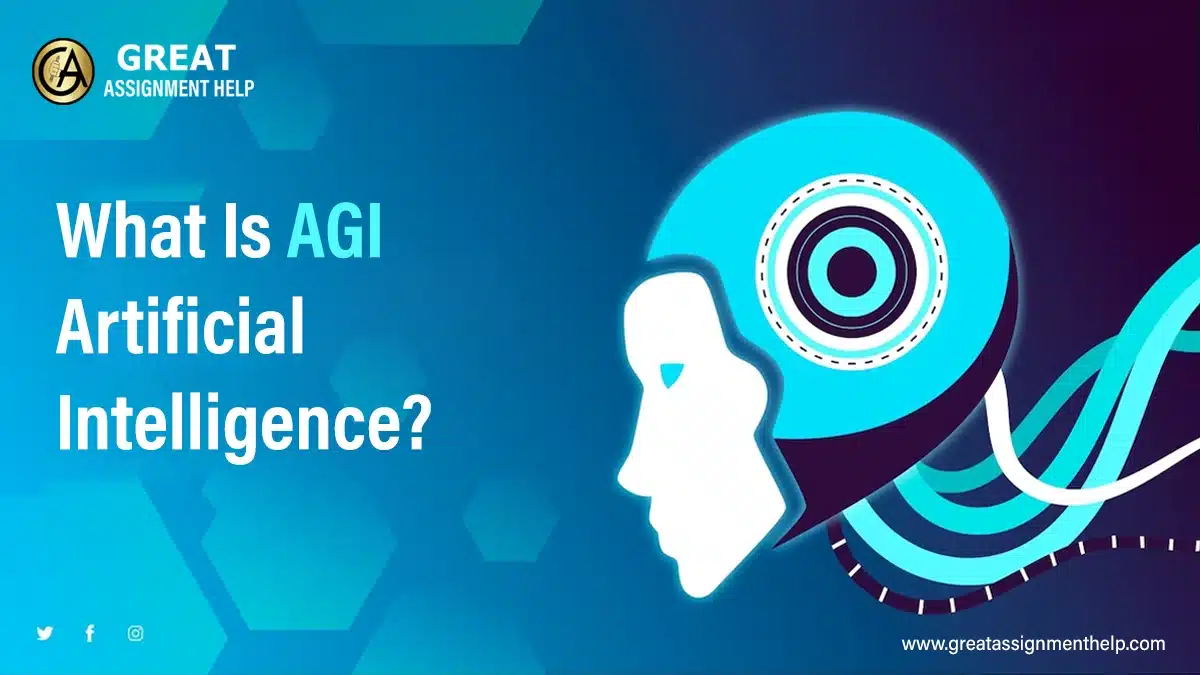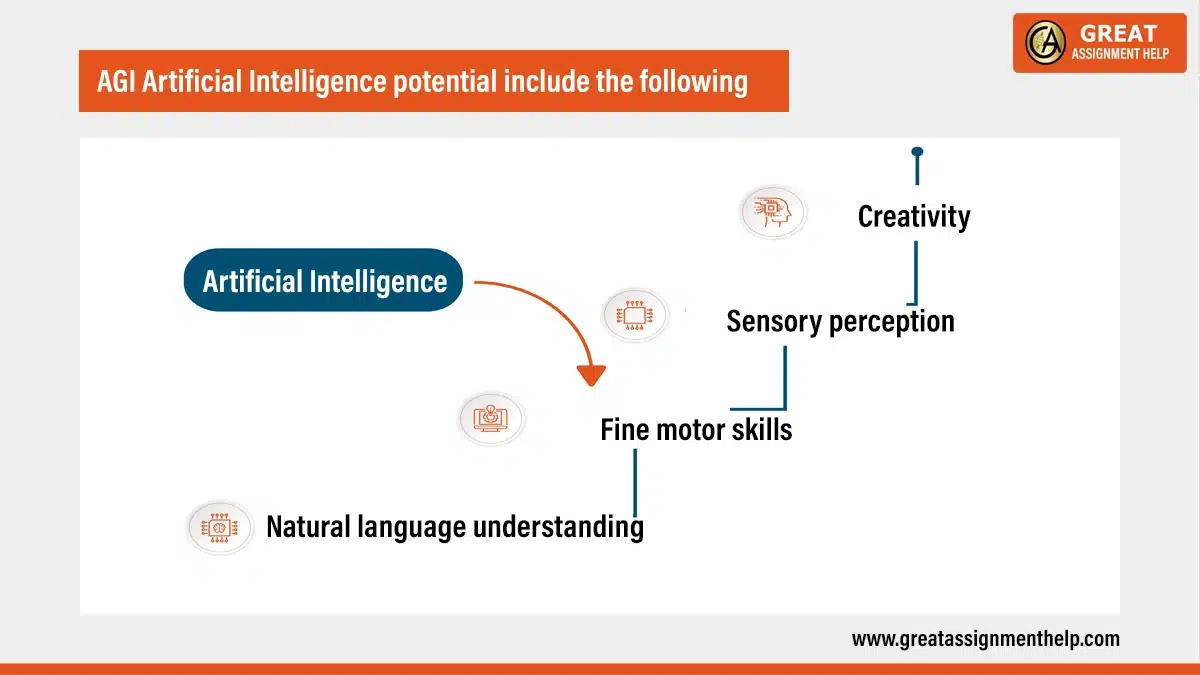In the past 20 years, artificial intelligence has taken the world by storm. Technical gear that people could not dream of is now a reality. Automated vehicles, Google Glasses, smartwatches, and voice assistants like Siri and Alexa are common examples of such intelligence. Now, researchers predict that the world will observe another revolution with the advent of AGI artificial intelligence. If you are curious to learn about what is AGI artificial intelligence and what its uses or scope will be in the future, read this blog. Here we have discussed these subjects and also shared details on their capabilities and examples.
What is AGI Artificial Intelligence?
AGI Artificial general intelligence is the depiction of comprehensive human cognitive abilities in software. It helps organizations find solutions through an artificial general intelligence system when faced with an issue. The purpose of an artificial general intelligence system is to carry out any task that a human being is equipped with.
Scientists from different fields of study have their own perspectives on AGI artificial intelligence. Computer scientists often characterize human intelligence in terms of being able to attain goals. In contrast, Psychologists define general intelligence in terms of adaptability or survival.
AGI Artificial intelligence is considered powerful. However, it is different from narrow artificial intelligence, where artificial intelligence is applied to resolve specific issues. Common examples of narrow artificial intelligence include supercomputers, expert systems, and self-driving cars.
Also Read: Learn How to Make Money with ChatGPT
What can AGI Artificial Intelligence do?
AGI Artificial Intelligence in computer science is an intelligent system with wide-ranging and complete knowledge and analytical computing capabilities. Until today, no real Artificial General Intelligence systems existed; they were only available in theories. The speculative presentation of these systems would be identical to that of a human. However, the large intellectual competence of Artificial General Intelligence would exceed human capacities due to its ability to deal with huge data sets at unbelievable speeds.
It is important to know that AGI Artificial Intelligence is still a theoretical concept. However, scientists expect that the day it is implemented in reality, artificial intelligence will be able to reach new heights in replicating human activities.
An Artificial General Intelligence system should have the following skills and knowledge:
- Abstract thinking.
- Background knowledge.
- Common sense.
- Cause and effect
- Transfer learning.
Practical examples of AGI Artificial Intelligence potential include the following:
Creativity
An AGI Artificial Intelligence system would hypothetically be able to read and understand human-generated code and enhance it.
Sensory perception
AGI Artificial Intelligence would excel at color recognition. It would also be capable of perceiving the intensity and three dimensions of static images.
Fine motor skills
It will be able to perform tasks that involve a high level of imagination. An example of this would be grabbing a set of keys from a pocket.
Natural language understanding
The significance of human language is highly circumstance-dependent. Artificial General Intelligence systems would have a level of intuition that would enable natural language understanding.
Navigation
The present Global Positioning System (GPS) can identify a geographic location. Once completely developed, Artificial General Intelligence would be able to forecast movement through physical spaces in a more enhanced way than the existing systems.
Artificial Intelligence researchers also expect that AGI Artificial Intelligence systems will have higher-level capacity to do the following:
- Deal with various types of learning, including algorithms.
- Develop fixed structures for all tasks.
- Recognize symbol systems.
- Use different types of knowledge.
- Understand belief systems.
- Undertake metacognition and utilize metacognitive knowledge.
Also read: Innovative Artificial Intelligence Topics for Research
Difference between AGI Artificial Intelligence and Artificial Intelligence
Existing Artificial Intelligence resources are termed as narrow Artificial Intelligence. When compared with Artificial General Intelligence, Narrow AI is in regular use today, whereas AGI Artificial Intelligence is theoretical.
Artificial General Intelligence should be able to carry out any tasks that a human can perform and showcase a variety of skills in different sectors without human interference. It may be able to solve issues better than humans.
In contrast, narrow Artificial Intelligence does extremely well at implementing specific tasks or types of problems. Many existing Artificial Intelligence systems employ a blend of machine learning, deep learning, reinforcement learning, and natural language processing for self-enhancing and solving specific types of issues. However, these technologies do not come near the cumulative capabilities of the human brain.
Examples of Artificial Intelligence
Examples of Artificial Intelligence in use today include the following:
- Customer support chatbots
- Voice aids like Apple’s Siri and Amazon’s Alexa
- Suggestion engines such as those Google, Netflix, and Spotify use to endorse content to users
- Artificial intelligence-supported business analytics and business intelligence tools that conduct data exploration, analyze customer sentiment and offer data visualizations for end users
- Image and facial recognition applications and the deep learning models they use
Examples of AGI Artificial Intelligence
Real Artificial General Intelligence systems are not yet available. However, there are some artificially intelligent technologies that surpass human capabilities. Artificial intelligence research is based on these systems.
Here are some examples of those systems:
Supercomputers
Supercomputers like IBM’s Watson are able to perform calculations that most other computers fail to handle. They combine their huge computing capabilities with Artificial Intelligence to perform science and engineering tasks that were impossible previously, such as modeling the Big Bang theory of the origin of the universe or the human brain.
Expert systems
These Artificial Intelligence-based systems replicate human judgment. They can advise medicine based on patient data and forecast molecular structure.
Self-driving cars
These Artificial Intelligence-guided vehicles distinguish other vehicles, people, and objects on the road and stick to the driving system and regulations.
ROSS Intelligence
ROSS is a legal specialist system that is also termed the AI attorney. It can search data from about 1 billion text documents, examine the information, and offer accurate responses to complex questions in less than three seconds.
AlphaGo
This is another example of artificial general intelligence that stands out for a specific type of issue resolution. AlphaGo is a computer program that can participate in the board game Go. Go is a complex game that is tricky for humans to master. One fine example of its power was observed in 2016 when AlphaGo defeated the world champion Lee Sedol in a five-point match.
Language model: Generative Pre-trained Transformer
GPT-3 and GPT-4 are versions of a program from OpenAI that can naturally develop human language. Technology can constantly imitate general human intelligence. In some cases, the wording cannot be distinguished from human output; however, the output provided by Artificial Intelligence is often flawed.
Music AIs
Dadabots is an Artificial Intelligence algorithm that, in a body of music, can generate a stream of its own estimation of the music.
If Artificial General Intelligence were applied to some of these examples, it could enhance their performance. For example, self-driving cars need humans to deal with decision-making processes in uncertain situations. The same is applicable for music-generating algorithms, language prototypes, and legal systems.
Read more: Excellent Music Essay Topics For Students
Future of Artificial General Intelligence
Different scientists have different opinions on the future of Artificial General Intelligence. Here are the most popular views:
Doubt over the execution of artificial general intelligence in reality
Many experts performing research on Artificial Intelligence are doubtful that it will ever be executable in reality. Some question whether it is even advantageous.
Stephen Hawking, a theoretical physicist, cosmologist, and author based in England, cautioned about the perils of Artificial General Intelligence during an interview with the British Broadcasting Corporation in 2014. He stated that the expansion of artificial intelligence can bring an end to the human race“. He warned that artificial intelligence would progress on its own and remodel itself, escalating at an ever-increasing rate. He predicted that humans, who slowly develop themselves, will struggle to compete with it in terms of skills and will slowly become outdated.
Artificial intelligence can gain human-like competence in the near future
Some Artificial Intelligence experts expect that the constant development of Artificial General Intelligence will make it as competent as humans. Ray Kurzweil, an inventor and creative thinker, predicted in an interview at the 2017 South by Southwest Conference that computers will attain intelligence similar to that of humans by 2029. Kurzweil has also envisaged that Artificial Intelligence will grow at an exponential rate, leading to revolutions that allow it to function at heights beyond human comprehension and control. This extent of artificial superintelligence is termed the singularity.
In 2022, this visualization came much closer to reality, triggered by an expansion in generative AI that became a sudden success. With the entrance of ChatGPT in November 2022 and the beginning of other user-friendly generative Artificial Intelligence interfaces, users worldwide have come across personal AI software that could recognize human text prompts and answer questions on an apparently limitless range of themes, although not always accurately. These generative Artificial Intelligence prototypes have showcased that they can develop a vast range of contents, from poetry and product descriptions to code and synthetic data. Image development systems like Dall-E are also flipping over the visual landscape, creating images that imitate famous artists’ work or photographs, apart from medical images, 3D replicas of objects, and videos.
For all their striking capabilities, however, their faults and hazards are apparent to users at this point. It indicates that they still fail to showcase the capabilities of fully independent Artificial General Intelligence. Whether it is due to the predilection of such tools to develop imprecision and misinformation or their inability to gain access to up-to-date information, human supervision is still required to alleviate possible harm to society.
All issues can be resolved through an algorithm
Other standpoints include Alan Turing and Alonzo Church’s Church-Turing thesis that they created in 1936. It reinforces the eventual growth of Artificial General Intelligence. It highlights that, in an inestimable amount of time and memory, any issue can be resolved through an algorithm, but what the name of that cognitive science algorithm will be is up for debate. Some say neural networks have the highest capability, while others believe in an amalgamation of neural networks and regulation-based systems.
Artificial neurons can replicate human brains
Another probable initiative originates from neuroscience. Neuromorphic computing uses artificial neurons and synapses to reproduce the genetic framework and performance of the human brain.
Also Read: Know about Online PhD in Artificial Intelligence
The Bottom Line
From the discussion above, it is apparent that artificial general intelligence is the future of the world. It will make human life quite easy and help resolve issues practically in the blink of an eye. However, how far it must be implemented needs to be examined. This enhanced form of artificial intelligence can take away many people’s means of living. If you are curious to learn more about what is AGI artificial intelligence,” have other queries related to the subject, or need help with writing a paper on this subject, just get in touch with our artificial intelligence assignment helpers. They can solve all your issues and help you submit your academic papers on time.




